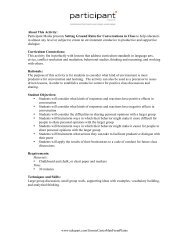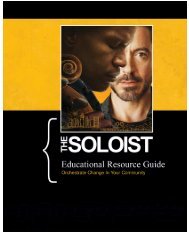THE KITE RUNNER COMPANION CURRICULUM - TakePart
THE KITE RUNNER COMPANION CURRICULUM - TakePart
THE KITE RUNNER COMPANION CURRICULUM - TakePart
Create successful ePaper yourself
Turn your PDF publications into a flip-book with our unique Google optimized e-Paper software.
HANDOUT 4.4A<br />
<strong>THE</strong> IMPACT OF FUNDAMENTALISM ON HUMAN RIGHTS<br />
CASE STUDY #1:<br />
LAYLA<br />
On May 29, [1997] Layla living in Khairkhana, Kabul, who was five months pregnant left her<br />
house for a routine pregnancy check-up at the nearby Parwan Maternity Clinic. She was dressed<br />
head-to-foot in the prescribed chadari [also called burqa] which only allowed a grill through which<br />
she could look out but even her eyes could not be seen. She had to wrap her self carefully in the<br />
chadari, as allowing her dress to be seen was against the imposed dress code. Halfway to the<br />
clinic she felt suffocated and felt an urgent need for fresh air. Turning into a deserted lane she<br />
raised her veil and drew deep breaths, relishing the feeling of relief. Suddenly a scourge-wielding<br />
Taliban militiaman screaming abuse materialised out of nowhere. “Why have you bared your face!<br />
Why have you bared your face!” he kept screaming while he poured out the vilest invectives. His<br />
whip hand was raised and before Layla could say anything the blow landed on her distended<br />
abdomen. Layla could only scream “Bradar jan, [brother, dear], don’t hit me, I am with child, I am<br />
going to the clinic” but the frenzied Taliban kept raining down blows on the miserable woman.<br />
The pain and the terror made Layla sit down on the dirt and the Taliban went away after a few<br />
more vicious blows of the lash. None of the few passers-by could dare to intercede. By now<br />
Layla was bleeding but both she and one or two passers-by knew that she could not hope for a<br />
helping hand as there were no women around and it is against Taliban ‘ethics’ and edicts for a<br />
male to touch any female other than close family members. Any man extending a helping hand<br />
to a woman in need was sure to receive the same treatment that had been meted out to Layla<br />
a moment ago. Layla could only drag herself to the clinic where she passed out. When she came<br />
to she was drenched in blood and the nurses told her that she had had a miscarriage. They<br />
sounded very worried about her own condition and it was not long before she lost consciousness<br />
again. The following day she developed a soaring temperature and doctors diagnosed peritonitis.<br />
They recommended abdominal surgery but before they could obtain the necessary go-ahead<br />
from the Taliban authorities Layla breathed her last.<br />
Quoted from “Reports from Afghanistan, 1997” available online at<br />
http://www.rawa.org/recent.htm#5<br />
CRITICAL<br />
THINKING<br />
QUESTIONS<br />
1. Does this case study involve human rights violations?<br />
2. If so, use the worksheet in HANDOUT 4.5 to document which of Layla’s<br />
human rights were violated<br />
3. Do you believe that the passers-by had a responsibility to Layla? Why?<br />
4. In your opinion, after reading about what the Taliban would do to a male<br />
who touches a female in public, do you think that the male passers-by are<br />
complicit in committing a human rights violation by not helping Layla to<br />
the hospital?<br />
5. If there was no option of dialing 911, and there was no other help in sight,<br />
and you were a male witnessing Layla bleeding to death, would you feel<br />
responsible for her and her child? How would you have handled the situation?<br />
6. Layla lost the baby and fell very ill in the clinic, yet she could not undergo surgery<br />
because she could not get the approval of the Taliban. Is the right to adequate<br />
healthcare a human right?<br />
7. Who should be able to decide whether or not a person can exercise his/her<br />
human rights?<br />
8. Do you believe that the Taliban or any government or leaders should have the<br />
authority to determine whether or not someone can receive healthcare? Why? Why not?<br />
44<br />
APPENDIX 4









